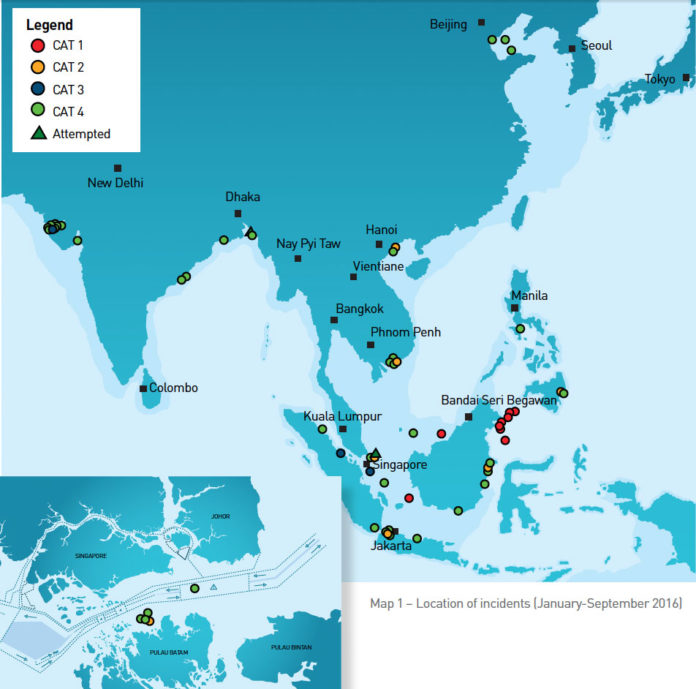
Concerns about piracy and armed robbery in[ds_preview] Asia is growing recently because of rising number of incidents. Now, a new initiative is set up in order to reduce the threats.
In Singapore, the inaugural meeting of Anti-Piracy Contact Points and »Workshop on Piracy and Armed Robbery against Ships involving participants from Africa and Asia« was held. Partners and participants were the Maritime and Port Authority of Singapore (MPA) and the Regional Cooperation Agreement on Combating Piracy and Armed Robbery against Ships in Asia (ReCAAP) Information Sharing Centre (ISC).
During the meeting, the aim was emphasized to foster closer linkages amongst anti-piracy contact points to enable more effective information sharing and communication. »Timely sharing and dissemination of information can often play a decisive role in deterring incidents«, the MPA said in a statement.
The authority described the meeting as part of Singapore’s continued contributions to international efforts to counter piracy and sea robbery in vital shipping lanes in Africa and Asia. »As a maritime nation and a hub port, Singapore places high priority on safe, open and secure shipping lanes«, it was added. The meeting was also attended by International organisations such as the International Maritime Organization (IMO), International Maritime Bureau (IMB) and NATO Shipping Command.
Andrew Tan, Chief Executive of MPA said, “The aim of this initiative is to enhance networking and information sharing among anti-piracy contact points from Asia and Africa, as well as international organisations like the International Maritime Organisation, to combat the problem in these two regions. While the nature and circumstances of the problem differ between the two regions, there are valuable lessons and best practices to be gained in this cross-sharing of experiences. We hope that this would be a useful starting point to grow a self-sustaining community of anti-piracy contact points that continue to maintain and develop ties and share information with one another.«
Besides getting a better understanding of each other’s work, participants were also able to share and exchange best practices, protocols and experiences in information sharing. Presentations, case studies and panel discussions covering co-operative information sharing mechanisms, such as the ReCAAP ISC, the Djibouti Code of Conduct Information Sharing Centres, Republic of Singapore Navy’s Information Fusion Centre (IFC) and the Inter-regional Co-ordination Centre on Maritime Safety and Security for Central and West Africa allowed for an exchange of views. There was also a dedicated session with the shipping industry, in particular those with vessels that ply key routes through Asia and Africa.
Masafumi Kuroki, Executive Director ReCAAP, said »Even though the incidents of piracy and sea robbery in Asia, and particularly in the Straits of Malacca and Singapore (SOMS) have declined since the beginning of 2016, we need to stay vigilant as these are still threats to international shipping.«
However, it was just shortly after the meeting, the International Maritime Bureau released its figures for 2016, marking it the year with the highest number of crew abduction since 10 years.
One outcome from this meeting was an initiative by MPA to put together and circulate a list of anti-piracy contacts for more effective communication and information sharing amongst the various anti-piracy contact points. MPA also hopes to explore future arrangements where such exchanges on anti-piracy information sharing are conducted on a more regular basis.



















